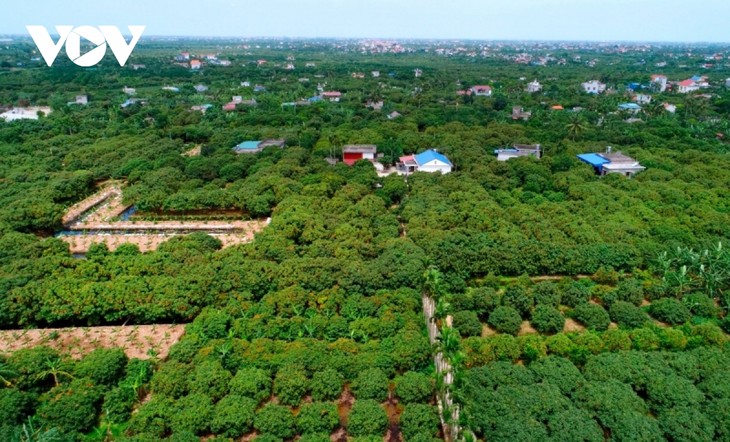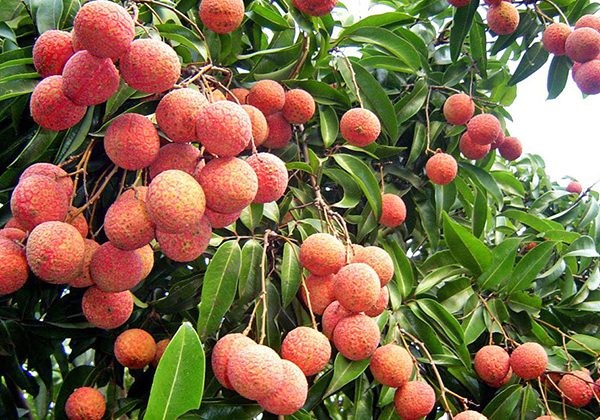 Thanh Ha district deploys the model to attach QR codes for qualified lychee gardens according to Global Gap standards. (Photo: VOV) Thanh Ha district deploys the model to attach QR codes for qualified lychee gardens according to Global Gap standards. (Photo: VOV) |
Thanh Ha district has pioneered in applying digital transformation in production in Hai Duong province to increase the output of agricultural products.
In the past, farmers were afraid of conducting digital transformation for farm produce because traders kept coming to buy.
But the prolonged COVID-19 pandemic caused many difficulties for the consumption and prices. So farmers changed the mindset and have been taking the initiative in production and consumption.
More and more households, cooperatives, and businesses have been involved in the production of farm produce according to OCOP, VietGap, and Global Gap standards to improve the brands and reduce costs.
Most agricultural products are purchased at the fields while production and consumption chains have been formed. Thanh Ha lychee, the most typical example, has been exported in recent years so its value has been increased.
By being introduced to e-commerce platforms like postmart.vn, sendo.vn, voso.vn, and lazada.vn, Thanh Ha-branded lychee has been reaching out across the nation and to demanding markets in Europe, the US, Japan, and Australia.
Nguyen Van Sung of Hamlet 4 in Thanh Ha district has completed this year’s lychee harvest and has pruned leaves to prepare the next crop. Sung's family earned a profit this year of 8,500 USD from a 500-square-meter area.
While tending his small farm, Sung took careful notes on a smartphone as instructed by local agricultural specialists.
“After harvesting, it’s time to prune branches. When the buds open and have wormy symptoms, I spray pesticide. When the lychee blooms, it’s fertilized with phosphate and nitrate to fight frost and worms. The care must abide by the instructions of the team leader on VietGAP and Global GAP standards. Everything is done on smartphones,” said Sung.
This year, Thanh Ha district has assigned QR codes to the lychee farms of 77 households to meet the Global Gap standards.
The households are led by Pham Van Giang, who comes to each farm to make sure the farmers strictly follow the regulations, particularly using the right pesticides in the right concentrations at the right time.
According to Giang, “Not all farmers have smartphones. Some need more training. This year, only the lychee farms of team 10 have been given QR codes, but pursuant to the directive of the Ministry and Hai Duong province, all lychee growing households will apply the Global Gap standards next year so that product origin can be traced and satisfy the requirements for exports.”
Attaching traceability stamps using QR codes is a new technology being used by lychee farms. This has helped Thanh Ha-branded lychees sell on e-commerce platforms like alibaba.com, voso.vn, sendo.vn, and lazada.vn, especially during the COVID-19 pandemic.
Nguyen Dac Viet Dung, Chairman of Sendo Board of Directors, said Hai Duong is one of the first provinces that Sendo e-commerce platform worked with last year and the actual results are very positive.
Although it was one of the first pilot campaigns, in a short time, thanks to high-quality products and a proper service model, Sendo helped cooperatives in Hai Duong sell more than 50 tons of lychee and 100 tons of green vegetables through an e-commerce platform.
Following the initial successes, Sendo keeps implementing the trading of safe agricultural products and perfecting the new shopping model called Sendo Farm since last year.
To serve the project, Sendo, farmers, and local relevant agencies worked closely together to set up a packaging and transportation process which has been then applied to other localities.
As a result, this year, Sendo has gained better results because a significant number of customers have become loyal to Sendo Farm's safe agricultural products and believe in the quality of the products sold on the Sendo floor.
Companies that buy and process farm produce for export have invested in smart devices to monitor activity in centralized raw material areas.
Ngo Thi Thu Hong, Director General of the Ameii Vietnam Company, said, “We have our own software to manage the material zones, which pinpoints the location of each lychee farm and monitors planting, tending, fertilizing, and spraying. Ameii also has an app for origin tracing. We use IT to connect farmers and government in raw material management to ensure compliance with high-end export markets.”
Putting agricultural products on e-commerce platforms has helped Hai Duong province have one more sustainable distribution channel for local specialties and connect supply chains, ensuring logistics and warehousing to serve e-commerce business, thereby maximizing the potential for agricultural development and improving the production value for Hai Duong’s agriculture.
The application of digital transformation has benefited farmers, producers, and consumers. In addition, the drastic participation of departments at all levels, especially state management agencies, and the communication system supports the replacement of manual paper record diary into electronic diary, products with quality authentication stamps so that consumers can verify the quality and real-time production process.
Changes in cultivation and promotion have made Vietnamese lychee available in 30 countries and territories around the world. Hai Duong lychee has been exported to Japan, the US, Australia, the EU, Singapore, and several Southeast Asian countries. Nearly half of the output of Hai Duong lychee is sold to China.
 This year Thanh Ha district of Hai Duong province has a bumper lychee harvest and high prices. (Photo: baochinhphu.vn) This year Thanh Ha district of Hai Duong province has a bumper lychee harvest and high prices. (Photo: baochinhphu.vn) |
Hai Duong has worked to export lychees to demanding markets and turn its agriculture industry into a high-tech, organic agricultural commodity industry.
Vu Viet Anh, Chairman of the Thanh Ha district People's Committee, said, “Our goal is to standardize product quality.”
“Thanh Ha district is clearly aware of this, especially now that the provincial People's Committee has outlined a project to develop high-tech, organic commodity agriculture until 2025 with an orientation to 2030. Many mechanisms and policies under the project are expressly for lychee. Thanh Ha district has tried to expand its lychee growing area and monitor the quality assurance process for meeting export standards," said Viet Anh.
Hai Duong harvested 61,500 tons of lychee this year, 10% of which was exported to Japan and Europe.
Exports remain modest, but significant, creating a premise for the local agriculture to develop market.
More particularly, this has demonstrated the changes in the mindset and perception of lychee growers from “production thinking” to “agricultural economic thinking” and the integration of “multiple values” on hectares of arable land when applying digital technologies.